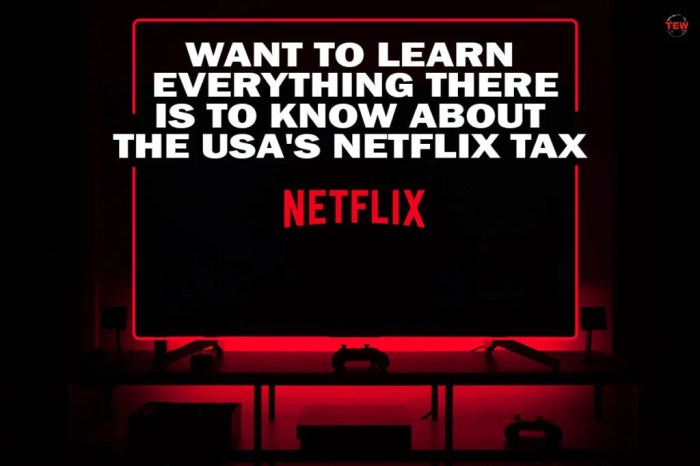Pennsylvania Imposes 6 Percent Netflix Tax: Is Your Binge-Watching About to Get More Expensive? Get ready to adjust your budget, Pennsylvania residents, because the state has decided to impose a 6% tax on Netflix streaming services. This decision has sparked debate, with some praising the tax as a way to generate revenue for the state, while others argue it will hurt consumers and stifle innovation in the streaming industry.
The rationale behind the tax is rooted in the state’s desire to broaden its tax base and capture revenue from the growing digital economy. Pennsylvania isn’t alone in this move, as several other states have implemented similar taxes on streaming services in recent years. However, the effectiveness of these taxes remains a subject of debate, with some studies suggesting they have a minimal impact on consumer behavior while others highlight potential drawbacks for both consumers and streaming companies.
Background of the Netflix Tax
Pennsylvania’s decision to impose a 6% tax on Netflix streaming services, often referred to as the “Netflix tax,” is a recent development in the state’s tax policy. This move reflects a growing trend across the nation, with many states seeking to expand their tax bases to include digital services.
The rationale behind this tax stems from the state’s need to generate revenue and address the changing landscape of consumption. Traditional sources of revenue, such as sales taxes on physical goods, have been challenged by the rise of online commerce and streaming services. Pennsylvania, like many other states, is looking to adapt its tax structure to account for these new realities.
The Historical Context of Similar Taxes
The imposition of taxes on digital services is not a new phenomenon. In fact, many states have already implemented similar taxes on services like music streaming, video games, and software downloads. These taxes are often modeled after existing sales taxes, but applied to digital products instead of physical goods.
The effectiveness of these taxes has been a subject of debate. Some argue that they are necessary to ensure fairness and to prevent businesses from avoiding taxation. Others argue that they can stifle innovation and discourage investment in the digital economy.
The Potential Economic Impact of the Netflix Tax
The economic impact of the Netflix tax on both Netflix and Pennsylvania residents is a complex issue with no easy answers. The tax could potentially lead to a slight increase in the cost of Netflix subscriptions for Pennsylvania residents. However, it is difficult to predict the exact impact, as Netflix could choose to absorb some or all of the tax increase, or it could potentially adjust its pricing strategy in other ways.
The tax could also have a modest impact on Netflix’s overall profitability. However, it is unlikely to have a significant impact on the company’s overall business operations.
It is important to note that the economic impact of the Netflix tax is likely to be relatively small, both for Netflix and for Pennsylvania residents.
Tax Implementation and Collection
The Pennsylvania Netflix tax, officially known as the “Use Tax on Digital Products,” was enacted in 2017 and went into effect on January 1, 2018. The tax is imposed on the sale or lease of digital products, including streaming services like Netflix, to Pennsylvania residents.
The tax is levied at a rate of 6% and is collected by the Pennsylvania Department of Revenue (DOR). The DOR utilizes a variety of methods to ensure the tax is collected, including working with streaming companies, monitoring sales data, and requiring businesses to register and report their sales.
Methods of Tax Collection, Pennsylvania imposes 6 percent netflix tax
The Pennsylvania DOR uses several methods to collect the Netflix tax, aiming to ensure compliance from both streaming companies and consumers:
- Self-reporting by streaming companies: The primary method of tax collection relies on streaming companies like Netflix to self-report their sales to Pennsylvania residents and remit the corresponding tax amount to the DOR. This involves collecting and submitting detailed sales data, including subscriber information and revenue generated within the state.
- Tax registration and reporting: The DOR requires streaming companies to register with the state as a seller and file regular tax reports, typically on a quarterly basis. This ensures transparency and facilitates the accurate tracking of taxable sales.
- Sales data monitoring: The DOR utilizes various data sources, including publicly available information and data provided by streaming companies, to monitor sales activity and identify potential discrepancies. This helps in identifying non-compliant businesses and ensuring tax compliance.
- Audits and enforcement: The DOR conducts periodic audits of streaming companies to verify the accuracy of their tax reporting and ensure compliance with state regulations. This may involve reviewing financial records, contracts, and sales data to ensure the tax is being collected and remitted correctly.
Challenges in Tax Collection
While the Pennsylvania DOR has established mechanisms for tax collection, there are inherent challenges in effectively collecting taxes from large, international companies like Netflix:
- Jurisdictional complexities: Determining the precise location of a sale and the applicable tax rate can be challenging, especially for digital products that are accessed remotely. This is further complicated by the international nature of streaming companies, who may operate across multiple jurisdictions with varying tax laws.
- Data privacy concerns: Accessing and collecting detailed sales data from streaming companies raises privacy concerns for users. The DOR needs to balance its need for accurate tax information with protecting consumer privacy, which can be a delicate balancing act.
- Compliance enforcement: Enforcing tax compliance on international companies like Netflix can be difficult, as they may operate outside of Pennsylvania’s direct jurisdiction. This can make it challenging to effectively monitor and audit their sales activities.
- Tax avoidance strategies: Streaming companies may employ various tax avoidance strategies to minimize their tax liability, such as shifting profits to low-tax jurisdictions or using complex financial structures. This can make it difficult for the DOR to accurately assess and collect the appropriate tax amount.
Role of the Pennsylvania Department of Revenue
The Pennsylvania Department of Revenue plays a crucial role in administering and enforcing the Netflix tax. It is responsible for:
- Developing and implementing tax regulations: The DOR develops and publishes detailed regulations governing the tax, outlining the scope of the tax, reporting requirements, and other relevant aspects.
- Collecting tax revenue: The DOR collects the tax from streaming companies and ensures the funds are deposited into the state’s treasury.
- Enforcing tax compliance: The DOR investigates and takes action against businesses that fail to comply with the tax law, including issuing penalties and fines.
- Providing guidance and support: The DOR provides guidance and support to streaming companies, taxpayers, and other stakeholders regarding the tax law and its implementation.
Future Implications of the Netflix Tax: Pennsylvania Imposes 6 Percent Netflix Tax
The Pennsylvania Netflix tax, while seemingly a small measure, could have significant implications for the future of streaming services in the state and beyond. This tax sets a precedent for taxing online entertainment, which could lead to similar taxes being imposed on other digital services and content.
Potential Implications for Streaming Services in Pennsylvania
The Netflix tax could impact streaming services in Pennsylvania in various ways:
- Increased Costs for Consumers: The tax will likely be passed on to consumers, resulting in higher subscription fees. This could make streaming services less affordable, particularly for budget-conscious households.
- Reduced Competition: The tax could make it harder for new streaming services to enter the Pennsylvania market, as they would face an additional cost burden. This could lead to less competition and potentially fewer choices for consumers.
- Shift in Consumer Behavior: Some consumers may choose to avoid paying the tax by accessing streaming services through VPNs or other methods, potentially leading to a decrease in revenue for streaming services.
The Spread of Similar Taxes to Other Online Services
The Pennsylvania Netflix tax could be a catalyst for other states to impose similar taxes on online services and digital content. This could lead to a patchwork of regulations across the country, making it difficult for businesses to operate nationally.
- Taxing Digital Content: States could expand their tax base to include digital downloads, music streaming services, video games, and other forms of online entertainment.
- Taxing Online Services: States could impose taxes on services like ride-sharing, food delivery, and online marketplaces.
Long-Term Economic and Social Consequences
Taxing online entertainment could have far-reaching economic and social consequences:
- Impact on Innovation: The tax could discourage innovation in the online entertainment industry, as businesses may be less willing to invest in new products and services.
- Digital Divide: The tax could exacerbate the digital divide, as low-income households may be less able to afford online entertainment services.
- Economic Growth: Taxing online entertainment could stifle economic growth in the digital economy, as businesses may choose to relocate to states with more favorable tax environments.
The implementation of the Netflix tax in Pennsylvania is a testament to the evolving landscape of taxation in the digital age. As streaming services become increasingly popular and ubiquitous, states are looking for ways to capture revenue from this burgeoning industry. While the tax may seem like a small inconvenience for individual consumers, its long-term implications for the streaming industry and the broader digital economy remain to be seen. Only time will tell whether this tax will be a boon for Pennsylvania’s coffers or a detriment to the state’s tech sector.
Pennsylvania’s new 6% Netflix tax might make you reach for the popcorn, but there’s a silver lining in the digital world: google launches firebase genkit a new open source framework for building ai powered apps. This new tool could revolutionize app development, perhaps even leading to more personalized streaming recommendations, making that Netflix tax a little less painful.
 Standi Techno News
Standi Techno News

